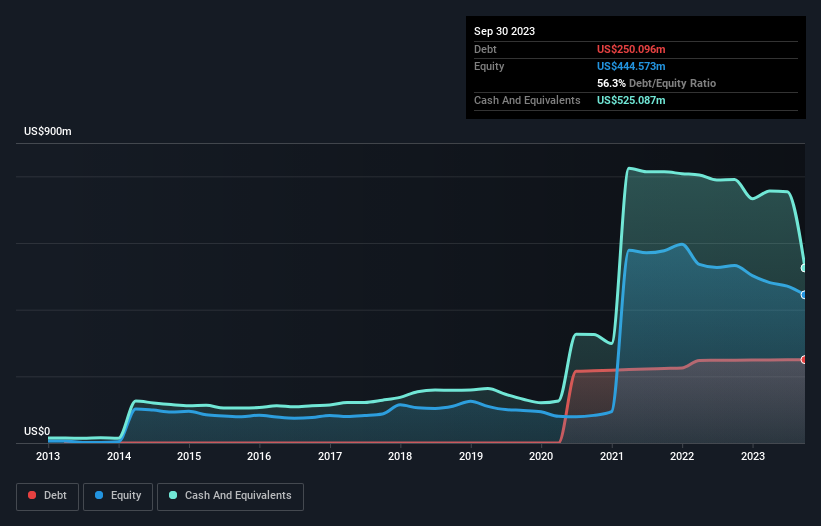- United States
- /
- Software
- /
- NasdaqGS:VRNS
Does Varonis Systems (NASDAQ:VRNS) Have A Healthy Balance Sheet?

Warren Buffett famously said, 'Volatility is far from synonymous with risk.' When we think about how risky a company is, we always like to look at its use of debt, since debt overload can lead to ruin. We note that Varonis Systems, Inc. (NASDAQ:VRNS) does have debt on its balance sheet. But the real question is whether this debt is making the company risky.
When Is Debt Dangerous?
Debt assists a business until the business has trouble paying it off, either with new capital or with free cash flow. Ultimately, if the company can't fulfill its legal obligations to repay debt, shareholders could walk away with nothing. However, a more usual (but still expensive) situation is where a company must dilute shareholders at a cheap share price simply to get debt under control. Of course, plenty of companies use debt to fund growth, without any negative consequences. The first step when considering a company's debt levels is to consider its cash and debt together.
See our latest analysis for Varonis Systems
What Is Varonis Systems's Debt?
As you can see below, Varonis Systems had US$250.1m of debt, at September 2023, which is about the same as the year before. You can click the chart for greater detail. But it also has US$525.1m in cash to offset that, meaning it has US$275.0m net cash.

How Healthy Is Varonis Systems' Balance Sheet?
The latest balance sheet data shows that Varonis Systems had liabilities of US$266.6m due within a year, and liabilities of US$309.6m falling due after that. On the other hand, it had cash of US$525.1m and US$111.1m worth of receivables due within a year. So it actually has US$60.0m more liquid assets than total liabilities.
This state of affairs indicates that Varonis Systems' balance sheet looks quite solid, as its total liabilities are just about equal to its liquid assets. So while it's hard to imagine that the US$4.82b company is struggling for cash, we still think it's worth monitoring its balance sheet. Succinctly put, Varonis Systems boasts net cash, so it's fair to say it does not have a heavy debt load! There's no doubt that we learn most about debt from the balance sheet. But it is future earnings, more than anything, that will determine Varonis Systems's ability to maintain a healthy balance sheet going forward. So if you're focused on the future you can check out this free report showing analyst profit forecasts.
In the last year Varonis Systems wasn't profitable at an EBIT level, but managed to grow its revenue by 6.6%, to US$488m. That rate of growth is a bit slow for our taste, but it takes all types to make a world.
So How Risky Is Varonis Systems?
While Varonis Systems lost money on an earnings before interest and tax (EBIT) level, it actually generated positive free cash flow US$46m. So taking that on face value, and considering the net cash situation, we don't think that the stock is too risky in the near term. With mediocre revenue growth in the last year, we're don't find the investment opportunity particularly compelling. When analysing debt levels, the balance sheet is the obvious place to start. However, not all investment risk resides within the balance sheet - far from it. Case in point: We've spotted 2 warning signs for Varonis Systems you should be aware of.
At the end of the day, it's often better to focus on companies that are free from net debt. You can access our special list of such companies (all with a track record of profit growth). It's free.
New: Manage All Your Stock Portfolios in One Place
We've created the ultimate portfolio companion for stock investors, and it's free.
• Connect an unlimited number of Portfolios and see your total in one currency
• Be alerted to new Warning Signs or Risks via email or mobile
• Track the Fair Value of your stocks
Have feedback on this article? Concerned about the content? Get in touch with us directly. Alternatively, email editorial-team (at) simplywallst.com.
This article by Simply Wall St is general in nature. We provide commentary based on historical data and analyst forecasts only using an unbiased methodology and our articles are not intended to be financial advice. It does not constitute a recommendation to buy or sell any stock, and does not take account of your objectives, or your financial situation. We aim to bring you long-term focused analysis driven by fundamental data. Note that our analysis may not factor in the latest price-sensitive company announcements or qualitative material. Simply Wall St has no position in any stocks mentioned.
About NasdaqGS:VRNS
Varonis Systems
Provides software products and services that continuously discover and classify critical data, remediate exposures, and detect advanced threats with AI-powered technology in North America, Europe, APAC, and rest of world.
Excellent balance sheet and fair value.
Similar Companies
Market Insights
Community Narratives



